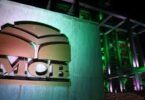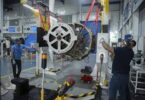DUBAI (Agencies): Dubai’s external non-oil trade in 2018 reached Dh1.3 trillion despite challenges facing global trade growth resulting from trade tensions between major economic powers and a global growth slowdown that has led to currency rate volatility in developing countries.
The latest trade figures show that Dubai is moving forward steadily as a leading international and regional trade hub that efficiently connects diverse international markets. The emirate’s overall trade performance reflects its status as one of the world’s best performing trade logistics service providers.
According to Dubai Customs, trade through free zones in 2018 grew by 23 per cent to Dh532 billion. Direct trade touched Dh757 billion while customs warehouse trade weighed in at Dh10.4 billion. Re-exports grew 12 per cent to Dh402 billion while imports totalled Dh770 billion and exports Dh127 billion.
Shaikh Hamdan Bin Mohammad Bin Rashid Al Maktoum, Crown Prince of Dubai and Chairman of The Executive Council, praised the performance and achievements of the trade sector in 2018 which sustained the growth of Dubai’s non-oil trade.
“The current growth of Dubai’s non-oil foreign trade is an indication that we are on the right path of revenue diversification in alignment with the values and standards outlined in the 50-Year Charter. The Dubai Silk Road Strategy supports decades of successful investment in developing the emirate’s infrastructure. In line with the vision of His Highness Shaikh Mohammad Bin Rashid Al Maktoum, Vice President and Prime Minister of the UAE and Ruler of Dubai, we are committed to develop our government services so that we can become a world-class model for future governments based on knowledge, innovation and advanced AI applications. We are currently developing a virtual commercial zone, the first of its kind in the region, which will allow investors to open bank accounts and grant e-residencies according to the highest standards of international laws and regulations.”
Reflection on ability
Sultan Bin Sulayem, DP World Group Chairman & CEO and Chairman of Ports, Customs and Free Zone Corporation said: “Dubai’s non-oil foreign trade is flexible and agile enough to overcome different global economic crunches. Despite a number of challenges that world trade has been through in the last decade, Dubai’s trade grew 72 per cent from 2009 and 2018, and the volume of goods in this period grew 44 per cent. This again reflects Dubai’s ability to attract global trade and investments and to keep up with changes, especially the rise of Asia and China as a global export hub. Dubai is a very important link in this global activity. Our international network of ports and free zones in different countries coupled with Dubai’s leading airline network have helped the emirate in its journey towards more success and progress.”
Bin Sulayem added: “Advanced facilities and services provided to investors and businesses have improved different aspects in the business sector. The number of transactions made by Dubai Customs in 2018 rose to 9.6 million compared to 9 million in 2017, and the number of companies registered at Dubai Customs rose to 223,000 companies. Dubai Customs hit a record in client happiness by topping the happiness metre with 97.49 per cent. Advanced systems and products, which employ artificial intelligence and smart applications such as the iDeclare application that enables passengers to declare what they carry in less than 5 minutes, were behind this achievement.”
Bin Sulayem pointed out that the Authorised Economic Operator (AEO) has seen rapid growth and development since its official launch under the aegis of the Federal Customs Authority (FCA) in October 2016.
The latest external trade figures show coherence, integration and diversity among the different modes of shipping: land, sea and air. Airborne trade rose 3.2 per cent to reach Dh612 billion and sea trade rose 3.4 per cent to Dh483 billion while land trade touched Dh205 billion.
Phones of all types topped the list of commodities in Dubai’s foreign trade in 2018 with Dh150 billion worth of trade. This reflects the adoption of advanced communications technology in Dubai as part of its journey to become the smartest city on earth. Next on the list was gold with Dh146 billion worth of trade, followed by jewellery (Dh106 billion), diamonds (Dh94 billion), and cars with Dh65 billion.
China maintained its position as Dubai’s biggest trading partner in 2018 with Dh139 billion worth of trade. India came in second with Dh116 billion worth of trade, followed by the USA in third place with Dh81 billion. Saudi Arabia continued to be Dubai’s largest Arab trade partner and its fourth largest global trade partner with Dh55 billion, followed by Switzerland in fifth place with Dh49 billion.






